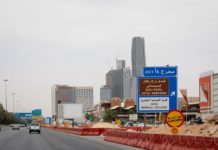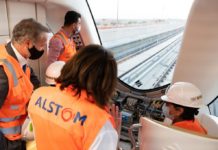The past three months have been an exciting period for construction companies in Saudi Arabia. The 450km Haramain High-Speed Rail has been inaugurated by Custodian of the Two Holy Mosques, King Salman bin Abdulaziz Al Saud. The $23bn (SAR86.3bn) Riyadh Metro has also seen significant progress in Q3.
The latter project has been a talking point for the Construction Weekteam this year. It remains one of the Gulf’s ongoing construction schemes that we – like most industry professionals – have watched with great interest, mostly because of the sheer volume of work it has created for the Middle East’s construction sector.
However, Riyadh Metro’s progress is also exciting to witness because it has changed the way Saudi Arabia’s construction market operates.
In 2009, Khalid Al-Falih, chairman of Saudi Aramco, outlined how the oil giant’s procurement process was evolving to meet international standards. According to a report by Construction Week’s sister title, Oil & Gas Middle East, Al-Falih – who is now Saudi Arabia’s Minister for Energy, Industry, and Mineral Resources – said: “We look at our dealings with suppliers, vendors, contractors, technology developers, and service providers as mutually beneficial long-term partnerships, and expect them to do the same.
“It is true that business is business, and we look for the best deal possible on the goods and services we procure. But we also recognise that we need to draw upon the capabilities and expertise of these firms in order to be successful, just as they need our business if they are to thrive.”
The truth of Al-Falih’s words from nearly a decade ago is being exemplified today with more than 30 local and international firms having come together to build the Riyadh Metro.
The third quarter of 2018 has been particularly eventful for the project team, with two sets of operation and maintenance contracts awarded for all six lines of the network this month. Work on the project’s deep tunnels and bridges is finished, according to a recent Saudi Gazette report, and surface routes are 93% complete. Construction is under way on more than 250 sites along the route. In June, French transport system provider Alstom revealed it was conducting initial dynamic tests for the Line 4 Depot Test Track, on which the Fast Consortium is working.
Riyadh Metro will undoubtedly contribute to economic growth in the kingdom, where road congestion is a significant problem. Perhaps more importantly for Saudi Arabia’s citizens, however, Riyadh Metro and Haramain Rail are both embodiments of the socio-economic changes under way in the country. As the megaproject nears its soft launch, which is scheduled for 2019 according to the National, it is important that we remember how Riyadh Metro has re-energised and transformed the construction climate in Saudi Arabia. More
By Neha Bhatia http://www.constructionweekonline.com














